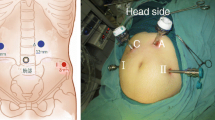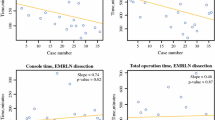Abstract
Background
Robot-assisted surgery is a new and emerging surgical procedure for rectal cancer patients. However, there is a lack of information regarding oncologic outcomes for this procedure. We aimed to evaluate oncologic and perioperative clinicopathologic outcomes of surgical resection using robotic instruments for rectal cancer.
Methods
Data from rectal cancer patients (n = 370) diagnosed with stage I–IV disease sited below 15 cm from the anal verge who underwent robot-assisted tumor-specific mesorectal excision consecutively from June 2006 to December 2010 were evaluated. Clinicopathologic and follow-up data were recorded prospectively and analyzed retrospectively. Perioperative clinicopathologic outcomes, postoperative complications, 3-year overall survival rate, and 3-year disease-free survival rate were analyzed.
Results
All patients underwent robot-assisted tumor-specific mesorectal excision. Of all postoperative pathologic stages, 15 (4.1 %) were stage 0 (pathologic complete remission), 126 (34.1 %) stage I, 95 (25.7 %) stage II, 118 (31.9 %) stage III, and 16 (4.3 %) stage IV. The 3-year overall survival rate was 93.1 % (pathologic complete remission = 100 %, stage I = 99.2 %, stage II = 97.1 %, stage III = 90.1 %, and stage IV = 48.4 %). The 3-year disease-free survival rate was 79.2 % (pathologic complete remission = 100 %, stage I = 93.7 %, stage II = 79.8 %, stage III = 69.6 %, and stage IV = 0.0 %). The 3-year cumulative local recurrence rate was 3.6 % (n = 10). The circumferential resection margin positive rate was 5.7 % (n = 21). Local recurrence developed in one patient and systemic recurrence developed in five patients. The total number of patients with postoperative complications was 86 (23.2 %).
Conclusions
These data show the feasibility and safety of robot-assisted tumor-specific mesorectal excision for rectal cancer in terms of oncologic outcomes.

Similar content being viewed by others
References
Guillou PJ, Quirke P, Thorpe H, et al. Short-term endpoints of conventional versus laparoscopic-assisted surgery in patients with colorectal cancer (MRC CLASICC trial): multicentre, randomised controlled trial. Lancet. 2005;365:1718–26.
Jayne DG, Guillou PJ, Thorpe H, et al. Randomized trial of laparoscopic-assisted resection of colorectal carcinoma: 3-year results of the UK MRC CLASICC trial group. J Clin Oncol. 2007;25:3061–8.
Jayne DG, Thorpe H, Copeland J, et al. Five-year follow-up of the Medical Research Council CLASICC trial of laparoscopically assisted versus open surgery for colorectal cancer. Br J Surg. 2010;97:1638–45.
Baik SH, Gincherman M, Mutch MG, et al. Laparoscopic vs open resection for patients with rectal cancer: comparison of perioperative outcomes and long-term survival. Dis Colon Rectum. 2011;54:6–14.
Laurent C, Leblanc F, Wütrich P, et al. Laparoscopic versus open surgery for rectal cancer: long-term oncologic results. Ann Surg. 2009;250:54–61.
Morino M, Parini U, Giraudo G, et al. Laparoscopic total mesorectal excision: a consecutive series of 100 patients. Ann Surg. 2003;237:335–42.
Ballantyne GH, Merola P, Weber A, et al. Robotic solutions to the pitfalls of laparoscopic colectomy. Osp Ital Chir. 2001;7:405–12.
Baik SH, Kwon HY, Kim JS, et al. Robotic versus laparoscopic low anterior resection of rectal cancer: short-term outcome of a prospective comparative study. Ann Surg Oncol. 2009;16:1480–7.
Kim NK, Baik SH, et al. Oncologic outcomes after neoadjuvant chemoradiation followed by curative resection with tumor-specific mesorectal excision for fixed locally advanced rectal cancer. Ann Surg. 2006;244:1024–30.
Strasberg SM, Linehan DC, Hawkins WG. The accordion severity grading system of surgical complications. Ann Surg. 2009;250:177–86.
Baik SH, Lee WJ, Rha KH, et al. Robotic total mesorectal excision for rectal cancer using four robotic arms. Surg Endosc. 2008;22:792–7.
Park YA, Kim JM, Kim SA, et al. Totally robotic surgery for rectal cancer: from splenic flexure to pelvic floor in one set up. Surg Endosc. 2010;24:715–20.
Heald RJ, Moran BJ, Brown G, et al. Optimal total mesorectal excision for rectal cancer is by dissection in front of Denonvillier’s fascia. Br J Surg. 2004;91:121–3.
Pigazzi A, Luca F, Patriti A, et al. Multicentric study on robotic tumor-specific mesorectal excision of the treatment of rectal cancer. Ann Surg Oncol. 2010;17:1614–20.
Baek JH, Mckenzie S, Garcia-Aguilar J, et al. Oncologic outcomes of robotic assisted total mesorectal excision for the treatment of rectal cancer. Ann Surg. 2010;251:882–6.
Tasang WW, Chung CC, Kwok SY, et al. Laparoscopic sphincter-preserving total mesorectal excision with colonic J-pouch reconstruction: five-year result. Ann Surg. 2006;243:353–8.
Ng SS, Leung KL, Lee JF, et al. Laparoscopic-assisted versus open abdominoperineal resection for low rectal cancer: a prospective randomized trial. Ann Surg Oncol. 2008;15:2418–25.
Nagtegaal ID, van de Velde CJ, et al.; Cooperative Clinical Investigators of the Dutch Colorectal Cancer Group. Macroscopic evaluation of rectal cancer resection specimen: clinical significance of the pathologist in quality control. J Clin Oncol. 2002;20:1729–34.
Kelly SB, Mills SJ, Bradburn DM, et al. Effect of the circumferential resection margin on survival following rectal cancer surgery. Br J Surg. 2011;98:573–81.
Tilney SH, Rasheed S, Northover JM, et al. The influence of circumferential resection margins on long-term outcomes following rectal cancer surgery. Dis Colon Rectum. 2009;52:1723–9.
Leong QM, Son DN, Cho JS, et al. Robotic-assisted intersphincteric resection for low rectal cancer: technique and short-term outcome for 29 consecutive patients. Surg Endosc. 2011;25:2987–92.
Bianchi PP, Ceriani C, Locatelli A, et al. Robotic versus laparoscopic total mesorectal excision for rectal cancer: a comparative analysis of oncologic safety and short-term outcomes. Surg Endosc. 2010;24:2888–94.
Park JS, Choi GS, Lim KH, et al. Robotic-assisted versus laparoscopic surgery for low rectal cancer; case-matched analysis of short-term outcomes. Ann Surg Oncol. 2010;17:3195–202.
Acknowledgment
This study was supported by a faculty research Grant from the Yonsei University College of Medicine (6-2011-0114).
Author information
Authors and Affiliations
Corresponding author
Rights and permissions
About this article
Cite this article
Baik, S.H., Kim, N.K., Lim, D.R. et al. Oncologic Outcomes and Perioperative Clinicopathologic Results after Robot-assisted Tumor-specific Mesorectal Excision for Rectal Cancer. Ann Surg Oncol 20, 2625–2632 (2013). https://doi.org/10.1245/s10434-013-2895-8
Received:
Published:
Issue Date:
DOI: https://doi.org/10.1245/s10434-013-2895-8




